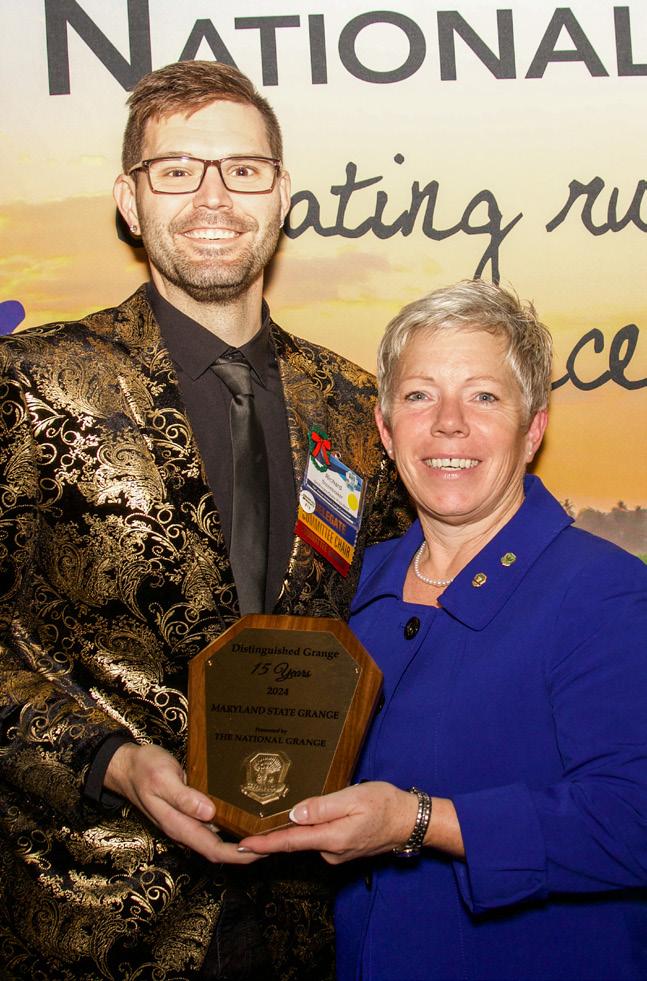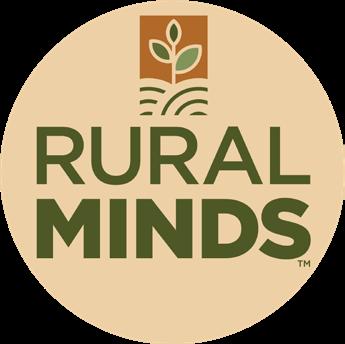

National Grange Honors 48
Distinguished Granges for 2024–2025 Program Year
The National Grange is proud to announce that 48 Granges from across the country have been recognized as Distinguished Granges for the 2024–2025 year. This includes 4 State Granges, 5 Pomona Granges, and 39 Community Granges that demonstrated exceptional leadership, service, and dedication to the values of the Grange.
engagement. Earning this distinction is no small feat—it requires consistent effort, planning, and collaboration throughout the year.

Now in its 16th year, the Distinguished Grange program honors local, Pomona (county/ region-level), Junior, and State Granges that embody the spirit of the Grange through excellence in programming, community service, communication, advocacy, and member and community
“Honoring these Granges affirms what we already know - commitment, creativity, and service can elevate local Granges into beacons for their communities, and to serve as an example to the Granges nearby,” said National Grange President Christine Hamp.
“While the bar is high, we believe every Grange in the country has the capability of being ‘Distinguished’ if they set their hearts and minds to it.”
Continued on page 3

and less likely

Rural women are at a higher risk of violence − and less likely to get help
by Walter S. DeKeseredy Professor of Sociology, West Virginia University
Originally published in The Conversation

I have been teaching a course on rural criminology since 2014, and most of my students are surprised by the information on violence against women presented to them.
Due to the lack of media attention to rural areas, my students come to class with the impression that all countrysides and small towns are safer than urban and suburban locales. In reality, rates of violent crime are often higher in many rural communities, and at times there’s even more silence around it.
Nearly 50 years of research shows that male violence against women knows no geographical or demographic boundaries. It occurs among all socioeconomic groups and in almost all communities, regardless of their size and location. Yet, crime in rural and remote places is reported to the police at lower rates than in urban areas.
Most criminology scholars do not study violence of any type in rural communities, which partly contributes
to the widespread belief that rural women are safer than their urban and suburban counterparts. Media reporting also overlooks brutal forms of violence perpetrated by men in intimate relationships with women.
Hidden in plain sight
Janet, from rural southeast Ohio, whom I interviewed along with sociologist Martin Schwartz in 2003, like some other women in this region we talked to, was beaten by her husband after going through brutal degradation:
“He wanted sex … or with his buddies or made me have sex with a friend of his. … He tied me up so I could watch him have sex with a 13-yearold girl. And then he ended up going to prison for it.”
Janet is by no means an outlier. I analyzed aggregate 1992 to 2005 National Crime Victimization Survey data along with criminologists Callie M. Rennison and Molly Dragiewicz. This data conclusively shows that rural women across the U.S. report physical and sexual violence at higher rates than those in more densely populated areas.
Research also shows that rural women in the U.S. are more likely to be killed by their current or former male partners compared to their urban and suburban counterparts. A study looking at data from 2005 to 2017 across 16 states, for example, found that female
Continued on page 5
Grange Heirloom for October
Use the Grange Heirloom Program to teach your members and the community about some of the key cornerstones of the Grange. Materials are available at http:// www.nationalgrange.org/heirloomprogram
You are welcome to choose any of the Grange Heirlooms at any time. Use the hashtag #GrangeHeirloom when you share these important pieces of our Order on social media.

Distinguished Granges
The 2025 Distinguished Granges are:
State Granges
16 Years – Maryland State Grange
14 Years – Pennsylvania State Grange
8 Years – New York State Grange
4 Years – Michigan State Grange
Pomona Granges 3 Years
St. Joseph/Cass/Kalamazoo #4 (MI)
2 Years
Clackamas County #1 (OR)
First Year
Jefferson County #5 (NY)
Mid-Michigan #61 (MI)
Treasure Valley #1 (ID)
Community Granges
16 Years
Five Mile Prairie #905 (WA)
Redland #796 (OR)
Stanford #808 (NY)
15 Years
Burns #160 (MI)
Grantham #968 (NC)
14 Years
Gratiot #1898 (MI)
13 Years
Prairie #1832 (IL)
Turkey Hill #1370 (IL)
Valley #1360 (PA)
12 Years
Harveys-Aleppo #1444 (PA)
10 Years
Bethlehem #137 (NY)
Mica Flats #436 (ID)
Russellville #91 (PA)
Springwater #263 (PA)
St. John’s #729 (NC)
Upton #125 (MA
9 Years
Hookstown #1980 (PA)
Linganore #410 (MD)
8 Years
Central Union #559 (CA)
Marys River #685 (OR)
7 Years
Creswell #496 (OR)
6 Years
Hamburg #2103 (PA)
Sterling #53 (MA)
5 Years
Eagle #1 (PA)
3 Years
County Line #1751 (IL)
Rio Linda #403 (CA)
Thurmont 3409 (MD)
2 Years
Big Knob #2008 (PA)
Fairview #2177 (IN)
Progress #96 (PA)
First Year
Brogden #967 (NC)
East Chatham #1066 (NY)
Kirkland #684 (NY)
Montague #140 (NJ)
Penns Valley #158 (PA)
Pleasant Ridge #135 (ID)
Poteet #1576 (TX)
South Rutland Valley #53 (NY)
Vaca Valley #298 (CA)
Among this year’s honorees are nine first-time Distinguished Granges, a sign of growth and enthusiasm across the organization. These Granges took
Continued from page 1
on new challenges, deepened local partnerships, and found ways to better serve their communities while upholding the traditions and values of the Grange.
Distinguished Grange Administrator Connie Johnston noted that the program has evolved to meet the needs of modern Granges while keeping its roots in service and excellence. “We’ve worked to make the point structure more flexible and the activities more accessible,” Johnston said. “It’s still an award you earn—there’s no handout—but we want every Grange to see a pathway toward it.”
Johnston also emphasized that there’s no one-size-fits-all model for success. There are more than three dozen options to help earn the required minimum number of points on the Community Grange application, allowing hundreds of combinations – no two Granges will become ‘Distinguished’ in the same way.
“Every Grange is unique,” Johnston said. “We don’t want anyone to change what’s working for them. The Distinguished Grange program isn’t about making every Grange look the same; it’s about recognizing and celebrating what each Grange does best while encouraging continued growth.”
Johnston highlighted some of the unique service projects and activities that Granges undertook and included in their applications. These included: Big Knob Grange #2008 (PA) hosted a Kansas City Barbeque Society-sanctioned
Continued on page 4
Distinguished Granges

Richard Stonebraker, Maryland State Grange President, accepts the Distinguished Grange Award for Maryland from National Grange President Christine Hamp at the 2024 National Grange Convention. Maryland is the only State Grange to be named “Distinguished” in each year since the program was established.
Photo by Lindsay Haggerty
BBQ competition with entrants from all over the US, also holding a cash bash to raise funds for the police department to buy a new K9, giving away over $12,500 in prizes, and over $10,000 to the police department; Central Union Grange #559 (CA) served lunch to the families at the Central Valley Ronald McDonald House, and also donated supplies and a monetary donation; Clackamas County Pomona Grange #1 (OR) sponsored a scarecrow contest at the Clackamas County Fair; Montague Grange #140 (NJ) worked with their Junior Grange to host a Senior Prom for senior citizens in the community; and Penns Valley Grange #158 (PA) donated 120 handmade stockings and 85
Continued from page 3
handmade Christmas cards to Stockings for Soldiers.
Distinguished Granges will be honored in the National Grange Honors Night on November 21. This year’s event will be livestreamed on the National Grange’s Facebook and YouTube pages, allowing everyone to participate. All Granges are encouraged to host watch parties and join in on the celebration. The livestream will begin at 8:30 p.m. Eastern Time / 5:30 p.m. Pacific Time and will also include the Grange Hall of Fame induction, Celebration of Remembrance, and departmental awards for the 2024-2025 Grange year.
“The Distinguished Grange program isn’t about comparison—it’s about celebration,” Hamp said. “It shines a light on what’s possible when members work together with purpose and pride. Every Grange has the ability to grow stronger, more active, and more visible in its community—and that’s what being Grange Strong is all about.”
The 2026 Distinguished Grange applications are now available online at http://www.nationalgrange. org/distinguished-grange, giving Granges an opportunity to begin tracking their progress and building toward the next year of recognition. Johnston encourages every Grange—whether new, revitalizing, or long-established—to review the application and start now. “Even small steps can add up,” she said. “You might be surprised how close you already are to qualifying.”

Rural Violence
homicide rates are higher in rural places.
Another rural Ohio woman told Schwartz and me about the violence she suffered in her relationship: “He’d come home and pull a double barrel and cock both barrels and said he was going to kill me. And it was like, wait a minute here, you know, it was two o’clock in the morning.”
Why are rural women at higher risk?
Research conducted since 1988 has identified several reasons for rural women being at higher risk of violence compared to those living in urban and suburban places. These include geographic and social isolation, widespread acceptance of violence against women, and community norms prohibiting women from seeking social support. What makes it even worse is the absence of effective social support services and the higher rates of gun ownership.
Many social workers, for example, must travel vast distances to reach rural battered women, often at their own expense. What is more, rural abusers “feed off” their female partners’ isolation.
As a woman Schwartz and I interviewed from Meigs County, Ohio, told us, “I didn’t have a car. I wasn’t allowed to go anywhere.” Her husband, however, who had “plenty of cars,” disabled them to stop her from seeking freedom and independence. “He taught me a lot about cars and I knew what parts I need. And there would be no spare. So, I couldn’t leave.”
In rural sections of Ohio and other states, as my research uncovered, there is common acceptance of abuse of women. In many rural areas, community norms often prohibit survivors from publicly talking about their experiences and from seeking help.
As one Appalachian woman put it: “I don’t sit around and share. I keep it to myself. Um, I, I believe that’s part of my mental illness. But I’m not one to sit around and talk about what’s happened.”
Jackie, another rural Ohio woman Schwartz and I interviewed, said that numerous women in her community suffer in silence: “It’s like we see, but we don’t. It’s like three monkeys: don’t see, don’t hear, don’t speak.”
Other women told similar stories of the unwillingness of people in their community to help them.
Gun ownership is a strong correlate of intimate partner violence in rural parts of the U.S.: In rural areas, 46% of adults own guns compared to 19% in urban places. Moreover, firearms are used in 54% of all rural
Continued from page 2

Rural areas have higher rates of violence against women than suburban and urban places.
domestic homicides.
What Neil Websdale, director of Arizona State University’s Family Violence Center, stated nearly 30 years ago still holds:
“Rural culture, with its acceptance of firearms for hunting and self-protection, may include a code among certain men that accepts the casual use of firearms to intimidate wives and intimate partners. In urban areas, it is more difficult for abusers to discharge their weapons and go undetected. People in the country are more familiar with the sound of gunshots and often attribute the sound to legitimate uses such as hunting.”
Gun ownership can create safety concerns for social workers, many of whom work alone.
Pathways to prevention
One, albeit highly controversial, prevention strategy is banning the possession, purchase, sale and transfer of handguns, which are the weapons men use the most to kill women regardless of where they live. That would greatly reduce the rate of male-to-female homicide in rural places, as it would in more densely populated areas.
For example, it is estimated that 38% fewer women are shot to death by intimate male partners in states where background checks are required for all handgun owners.
Continued on page 6
Photo licensed via AdobeStock
Rural Violence
Similarly, the federal Violence Against Women Act includes provisions that, when an order of protection – also referred to as a restraining order – is granted, it leads to the person being restrained losing any gun permits or permission to keep guns at home.
This, in turn, leads to a reduction in intimate femicide. A number of states have gone further than the federal law, extending gun possession bans to people under temporary – not just permanent – restraining orders. Such bans have further reduced intimate partner homicide, by a best estimate of 14%.
Libraries as safe spaces
Rural libraries have proven to be a vital resource in the struggle to end interpersonal forms of abuse of women. They are more accessible in many U.S. rural communities than are shelters, public transportation and other services.
Rural librarians can direct survivors to legal assistance and domestic violence service websites, help find books and pamphlets that are useful for survivors, and provide programming for survivors’ children if survivors need time to think about their options.
The librarian could also help survivors travel from the library to the nearest shelter and work with the police to provide transportation assistance. Moreover, the librarian could help connect survivors with shelter workers via telephone and arrange for the arrival of survivors and their children at a shelter.
Continued from page 5
We are starting to see attorneys offering survivors legal advice in rural public libraries and providing libraries with information kiosks that include materials on legal issues related to the abuse of women.
A word of caution, though, is necessary. Libraries and other places that offer services to abused rural women require architectural changes that preclude people from hearing survivors talk about their violent experiences.
The chances that people might overhear survivors talking is much greater in smaller communities and hence more likely to jeopardize the safety of survivors and their children.
A multipronged strategy is always necessary. For example, some experts in the field call for setting up women’s police stations and safe houses in rural areas. They also recommend getting rural men to participate in anti-violence and anti-sexist community-based activities, such as holding town hall meetings to raise awareness about violence against women.
All too often, people think of ending violence as an event simple enough to fit on a bumper sticker or the side of a coffee mug. Just leave, and then it will be over.
Unfortunately, for a large number of women and children, particularly in rural areas, leaving and ending up in a safe place is a complex, ongoing process, and for some women and children it is one that never ends.
Volunteers needed for rural Postpartum
Advisory Committee

In keeping with their mission to serve as the informed voice of mental health in rural America, Rural Minds is hosting a onehour virtual Rural PPD Advisory Committee meeting on November 12 from 1:00pm to 2:00pm ET.
In preparation, Rural Minds is forming an eightperson program committee of women who have managed postpartum depression while living in rural America. This will be a private forum for them to share their personal experience with any of the following:
• Disease Awareness
• Symptoms
• Diagnosis
• Stigma
• Treatment
• Disease Management
• Recovery
• Insurance coverage Information that’s gathered from the moderated discussion will identify underserved or unmet needs, which will drive development of new PPD content and resources.
Members selected for this Advisory Committee will receive a $150 honorarium for their participation. Please submit your application here: https://forms. gle/HS1FavDhSCTqiCq37
If you have any questions, please contact Clarissa Hollander at clarissa@ruralminds.org.

The America’s 250th Grange Workgroup is celebrating our country’s 250th Anniversary by “throwing back” to some classic recipes from Grange cookbooks. Do you have favorite recipes that evoke the American spirit which you would like to see published again? Send them to Lew Gaskill at olgaskill@comcast.net. Please include which Grange cookbook your recipes come from.
Grandma Edna’s
Corn and Broccoli
1 package chopped broccoli
1 egg beaten 1/2 stick butter
from Winchester Grange #74 Commemorative Recipe Book (2013) Celebrating 125 Years 1888-2013
Fran Cooper, Winchester Grange #74, CT
1 can cream-style corn
1 cup Pepperidge Farm Stuffing
1 small onion – chopped
Combine semi-thawed broccoli, corn, egg, onion, salt and pepper in casserole dish. Add melted butter to crumbs. Add to mixture, saving 1/4 cup to cover top. Bake at 350 degrees for 60 minutes.
Pumpkin Bread
4 cups flour
1 teaspoon baking powder
1 teaspoon salt
1-14oz. can pumpkin (without spices)
from Winchester Grange #74 Commemorative Recipe Book (2013) Celebrating 125 Years 1888-2013
Recipe submitted in memory of Sandy Adams, previously appeared in the 1979 Winchester Grange Recipes Cookbook.
4 large eggs
1 teaspoon each, cinnamon, nutmeg, & allspice
3 cups sugar
2 teaspoons baking soda
1 cup oil
2/3 cups cold water
1/2 teaspoon cloves
Combine dry ingredients. Mix well. Pour in oil, add pumpkin. Blend well. Add eggs, one at a time, beating well after each. Pour into two well-greased and floured loaf pans. Bake 1 hour at 350 degrees F or until done. Freezes well.

Grange Member Benefit: MeMberDeals

Access exclusive savings on everything from car rentals to hotels, even tickets to theme parks, performances, and sporting events.
Shop savings and deals on computers, jewelry, phones, vision, and more! There’s no end to the things you can find at MemberDeals.
Savings include:
• Walt Disney World & Disneyland
• Universal Orlando & Universal Studios Hollywood
• Sea World
• Six Flags
• Busch Gardens
• Knotts Berry Farm
• LEGOLAND
• Hersheypark
• Sesame Place
• Water Parks
• Zoos & Aquariums
• Hotels
• Shows, Sports, & Concerts
• Movie tickets at AMC, Regal and more
• Rental Cars (Avis, Budget, Hertz, & others)
• Shopping Deals
• and much more!
Visit https://www.memberdeals.com/ nationalgrange/?login=1 today to start saving.
Grange Store


